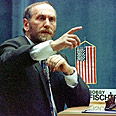
Cold War chess genius Bobby Fischer dies in Iceland
America's first and only world chess champion dies at age 64 in Reykjavik after a serious illness
Bobby Fischer, who became America's first and only world chess champion after defeating the Soviet Union's Boris Spassky at the height of the Cold War, has died at the age of 64.
Gardar Sverrisson, a spokesman for the reclusive Fischer, said the chess genius died at midday on Thursday in Reykjavik, the site of his famous victory over Spassky. Sverrisson said Fischer had died after a serious, but unspecified, illness.
Feted as a national hero for beating Spassky, the eccentric Fischer fell foul of US authorities in his later years. Fischer also stirred controversy for numerous anti-Semitic remarks and tirades against his former homeland.
Rumors that Fischer, once dubbed the "Mozart of Chess", was ill had circulated in recent weeks on chess-related websites.
A friend of the chess master told Reuters Fischer was taken to a hospital in October of last year. But, not trusting doctors, he later went home and received treatment there, where he was looked after by friends.
A child prodigy who once said he liked to watch his opponents squirm, Fischer became an Icelandic citizen, coming to Iceland in March 2005. He could have faced jail in the United States for violating sanctions on former Yugoslavia by playing a chess match there against Spassky.
Former world chess champion Garry Kasparov hailed Fischer as a pioneer of professional chess. "We have lost a great individual," Kasparov told reporters in Moscow.
"He was always alone ... But while alone he demonstrated that a human being is capable of reaching new heights. We have lost a great warrior, we have lost a great mind."
Spassky, who now lives in Paris, was less eloquent on the subject of Fischer. Asked by Reuters for his reaction, he said:
"It's bad luck for you. Bobby Fischer is dead," then hung up.
The brilliant and unpredictable American abandoned his world title without moving a pawn by failing to defend his crown in Manila in 1975. World chess authorities reluctantly awarded it to challenger Anatoly Karpov of the Soviet Union, who was to hold it for the next decade.
Fischer then all but disappeared from the public view for much of the next two decades.
'A period of introspection'
He made headlines when he came out of seclusion to play Spassky in Yugoslavia in 1992, at a time when the country was under sanctions during Belgrade's war with breakaway republics.
He vanished after the match, for which he won $3 million, and resurfaced after the Sept. 11, 2001, attacks on America. In an interview with a Philippine radio station, Fischer praised the strikes and said he wanted to see America "wiped out".
Fischer, who also stirred controversy with anti-Semitic remarks, was allowed into Iceland in March 2005 after eight months in detention in Japan fighting a US deportation order.
Einar Einarsson, president of a campaign group that fought to bring Fischer to Iceland from Japan, said Fischer liked living in Iceland but at times felt frustrated and trapped because he could not travel.
While debate has always raged in chess circles about who is the greatest, Fischer himself was in no doubt. He once said: "It's nice to be modest, but it would be stupid if I did not tell the truth. It is Fischer."
He was called the "Mozart of Chess" when he began winning at the age of six.
Fischer gained a reputation for being cocky. He told interviewers his favorite moment was when opponents began to feel they would lose. "I like to see 'em squirm," he said.
He was US junior champion at 13 and US Open champion at 14, retaining the title whenever he chose to defend it.
He became an international grandmaster at 15, gaining the rating at his first international tournament in Yugoslavia. He once defeated 21 grandmasters in succession—no US player had beaten more than seven in a row.
As Fischer's fame grew, his temperament became more unpredictable. He walked out of tournaments because of what he considered to be bad lighting or bad air conditioning.
In the mid-1960s, he opted out of two world championship qualifying series because he thought the tournament system favored the Russians. In 1967, when officials would not meet his demands for better conditions, Fischer angrily withdrew from international competition "for a period of introspection".
He took his collection of chess books to California, where he later said he had "plotted my revenge if I ever came back".
When the rules were changed in 1972 to include an eight-player eliminator to find the challenger to world champion Spassky, Fischer had the chance to prove he was as good as he always said he was. He became a national hero.
But by the 1990s, he was said to be living under assumed names in cheap hotels in Pasadena on the outskirts of Los Angeles, surviving on occasional royalties from his books.
One commentator said there was one constant through his life -- his "running battle with the rest of the human race".










